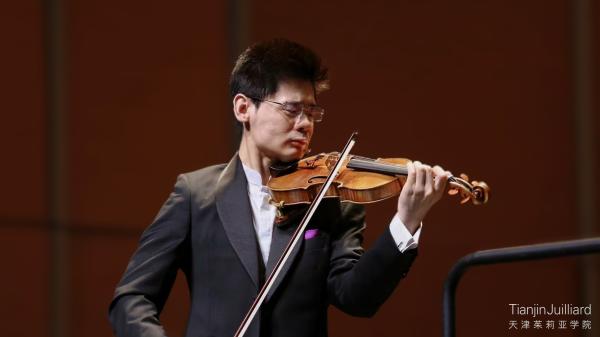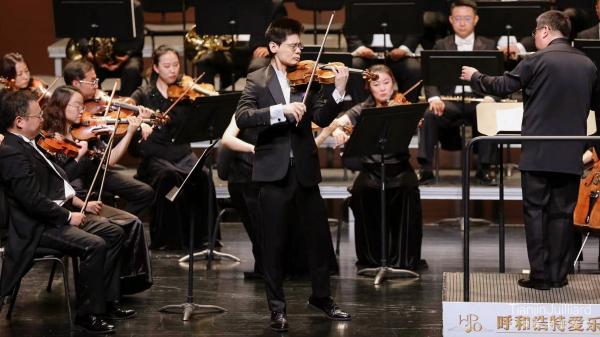Returning to his roots, celebrated violinist and Tianjin Juilliard violin faculty Angelo Xiang Yu reflects on returning to his hometown orchestra as the inaugural official artist-in-residence at the Inner Mongolian Symphony. He recently closed out the season performing Beethoven's Violin Concerto, and it was an emotional journey as well as a milestone marking the culmination of the orchestra’s first official full season. Through these performances, Yu has reconnected with his community through music.
Returning to your hometown for the final performance of the season with the Inner Mongolian Symphony, how does it feel to perform Beethoven's Violin Concerto in a place that holds so much personal significance?
It is quite an emotional journey for me to return to Inner Mongolia, where my musical journey began, and performing such a significant piece feels like coming full circle. Beethoven's Violin Concerto is widely considered the most difficult violin concerto of all time. It represents a personal and artistic milestone, as well as a tremendous challenge emotionally and physically. The emotional connection I have with the place and its people adds a unique depth to the performance, making it not just a concert, but a heartfelt dialogue with my roots.
This concert marks the end of the orchestra’s first official full season. How does this milestone of the Inner Mongolian Symphony reflect the growth of the performing arts in China?
The completion of the orchestra’s first full season is a remarkable milestone which showcases the exponential growth of classical music in China. When I was growing up in my hometown, there were very few classical music concerts. Today, seeing an orchestra thrive here is a testament to the increasing appreciation and investment in classical music across the country. It highlights how the arts are becoming a more integral part of people’s daily lives. And I’m certainly happy to see the rising enthusiasm and engagement of the public with classical music.
How has this residency helped you to connect with your roots and to the community?
It has been a deeply enriching experience, allowing me to reconnect with the community in my hometown on such a profound level. I've had the pleasure of working with the musicians from the orchestra by playing side-by-side in concerts, rehearsing together, sitting in the orchestra with them, coaching chamber music, and so on. These experiences have brought us closer and emphasized the spirit of collaboration. To me, collaboration is the real key to a successful relationship.
How does it feel to have been the orchestra’s inaugural artist-in-residence? Can you share some highlights from the four performances you have given this season?
Being the artist-in-residence for the orchestra has been a real honor. This season began with Mozart's Violin Concerto No. 3, followed by a collaboration between the Shanghai Quartet and the Inner Mongolian Symphony, performing in a string orchestra setting. In May, I performed the Mendelssohn Violin Concerto, and for the closing concert, I played Beethoven's Violin Concerto. These three violin concertos are my all-time favorites, and I'm truly happy to share my interpretations with the audiences here. The collaboration between the Shanghai Quartet and the orchestra was special, as we sat side by side with the orchestra members, creating a unique chamber music experience. It was such a rewarding experience that everyone enjoyed immensely!
Can you share some insights into the Inner Mongolian Symphony, and the most rewarding highlights?
As the first-ever artist-in-residence of the orchestra, I had the chance to witness tremendous growth over the course of the season. Balancing the artistic vision with the logistical realities of a developing orchestra has been challenging. However, overcoming these challenges has led to the most rewarding moments. I cannot express in words how much better the orchestra sounds every single time I returned. Working with different guest conductors and guest concertmasters, each bringing their unique and distinctive artistic vision, has been a breath of fresh air for the ensemble, accelerating the orchestra's development. Witnessing this growth and the genuine connection with the community, along with the heartfelt appreciation from audiences, has made every challenge worthwhile.
What are your plans for the future with this orchestra and beyond? Do you have any upcoming projects or performances that you are particularly excited about?
Looking back, I built such a healthy relationship with the leaders and members of the orchestra, and many of them wish for me to visit often, not only to play with them again but also to engage in more events, such as community engagement concerts, educational programming, and master classes, to further enrich the classical music culture in my hometown. I look forward to this and feel that it is my responsibility, as someone who grew up here in Inner Mongolia, to give back to my community and do something meaningful for my hometown.

